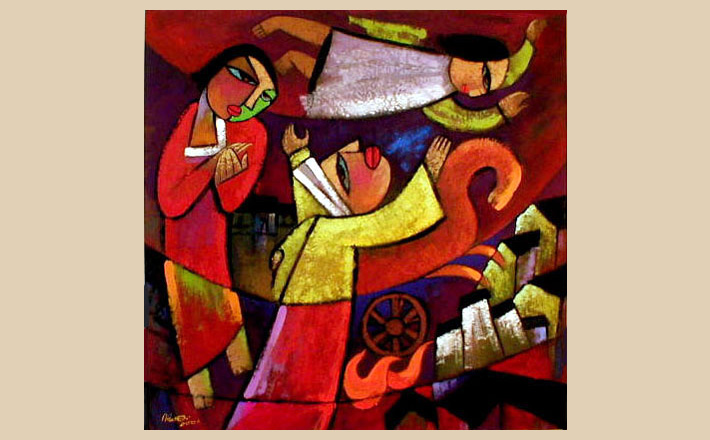Commentary on Galatians 5:1, 13-25
The first verse of our text for this week includes a reiteration of the great theme of Paul’s letter to the Galatians: “For freedom Christ has set us free” (Galatians 5:1).
Then, verses 13-25 will set out the nature, meaning, and parameters of that freedom.
Freedom to love one another
Paul has already insisted that freedom in Christ is freedom from the requirements of the Jewish law. In the verses not included in the present pericope, Galatians 5:2-12, Paul has again insisted on one of his central points throughout the letter that Christian freedom is freedom from the requirement of male circumcision, as well as from the required keeping of the whole Jewish law. In fact, in 5:6 Paul announces what will be the theme of our pericope in the subsequent verses 13-25: “For in Christ Jesus neither circumcision nor uncircumcision counts for anything; the only thing that counts is faith working through love.”
Now he sets parameters to this freedom: it is not freedom for self-indulgence (Greek “the flesh”), but rather “through love become slaves to one another” (Galatians 5:13). Freedom from the requirements of the law does not constitute an “anything goes” freedom; it still has constraints. The constraints are the responsibility and commitment to the welfare of others in the community. While Paul had invoked the social reality of slavery to help describe in 3:28 the new life in the new community in Christ, saying that in the Christian community “there is no longer slave or free,” he does not hesitate to use the same language positively — recycled, reimagined, repurposed, reused — here to describe the relationship and mutual commitment of the members of the community to one another. In the same way, Paul describes himself as a slave of Christ in Galatians 1:10 (see NRSV footnote).
The works of the law after all
Remarkably, amidst all the anti-law polemic of Galatians, the work of faith which is “the only thing that counts” is precisely the work of the law. Not, of course, law-works such as circumcision, food laws, and the like, but the ethical core and central command of the law: “You shall love your neighbor as yourself” (Galatians 5:14, quoting Leviticus 19:18).
This love of self and neighbor, this being slaves to one another in love, stands opposed to the works of self-indulgence/the flesh, to the items in Paul’s partial list (“and things like these”) in vv. 19-21 of works which harm and disrespect oneself and others in the community.
The works of the Spirit
It is therefore not for nothing that love heads the list of the fruit — not fruits — of the Spirit in the famous list found in vv. 22-23. On Paul’s use of the singular “fruit,” M. Eugene Boring and Fred B. Craddock write that
while the “flesh” results in a plurality of works, … God’s Holy Spirit … generates a singular fruit. Love is not one “virtue” or “ideal” among others, but the care for others expressed in concrete acts of unselfishness, the mainspring of all the other activities …1
Thus Paul’s thesis stands: the only thing that counts is faith working through love.
Thoughts and questions toward preaching
As I write this, in early March 2016, the U.S. presidential primary and caucus season is in full swing. And as one views the candidates’ debates there is no shortage of many of the “vices” on Paul’s list of the works of the flesh: enmities, strife, jealousy, anger, quarrels, dissensions, factions, envy. And this will likely continue well into summer and fall and right up to November 1.
It is also not for nothing that Marcus J. Borg and John Dominic Crossan write that this sort of life is “living by the ‘wisdom of this world,’ the normalcy of the domination systems of [Paul’s] time,” wherein “societies [are] ruled by a few who use … their power, wealth, and ‘wisdom’ to shape the social system in their own self-interest.”2
While it may be true that this is “politics as usual” and not much different from any other election year behavior, it is also true that each of us suffers from the same spiritual maladies of heart and mind: flesh battles Spirit, Spirit is inhibited by flesh. And one can see the validity of the NRSV’s translation “self-indulgence” rather than “flesh” both on the political stage as well as within our own hearts and communities of faith.
How much difference do our Christian faith and the Spirit of Christ make to our communal life within the Christian community? How do they affect our lives “out in the world”? Do we avail ourselves sufficiently of God’s gift in Christ of the fruit of the Spirit, steadfastly resisting the works of the flesh both within and without?
The NRSV’s translation “self-indulgence” is particularly helpful in clarifying the meaning of Paul’s quoted passage from Leviticus 19. How well do we love ourselves and exercise the fruit of the Spirit in our internal relationship with and to ourselves — substituting self-love for self-indulgence? How well do we refuse to be coopted by and seek alternative patterns of living to the domination system and its encouragement of self-interest? And does that self-love serve as the basis for neighbor-love which builds up the Christian community and enables us to “bear one another’s burdens”? (Galatians 6:2).
May the Spirit of Christ’s love be continually given and received in our lives.
Notes:
1 M. Eugene Boring and Fred B. Craddock, The People’s New Testament Commentary (Louisville: Westminster John Knox Press, 2004), 592.
2 Marcus J. Borg and John Dominic Crossan, The First Paul: Reclaiming the Radical Visionary Behind the Church’s Conservative Icon (HarperOne: 2009), 206, 135.


June 26, 2016